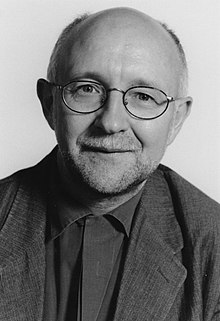John Worrall (philosopher)
| John Worrall | |
|---|---|

John Worrall, c. 2000
|
|
| Born |
November 27, 1946 Leigh, Lancashire (now Greater Manchester) |
| Nationality | British |
| Alma mater | London School of Economics |
| Era | 21st-century philosophy |
| Region | Western Philosophy |
| School |
Analytic philosophy Structural realism |
| Institutions | London School of Economics |
|
Main interests
|
Philosophy of science |
|
Notable ideas
|
Revival of structural realism |
|
Influences
|
|
John Worrall (/ˈwɒr.əl/; born 27 November 1946) is a professor of philosophy of science at the London School of Economics. He is also associated with the Centre for Philosophy of Natural and Social Science at the same institution.
Worrall attended Leigh Grammar School and originally planned to join the school’s Scholarship Stream in order to then apply for university admission to Oxbridge. He later described his change of mind, saying: "Think The History Boys – it then meant an additional year in the Sixth Form, and so another year in Leigh and I just couldn't face that!" After receiving a single brief career advice session he instead decided to apply to the London School of Economics "to study mathematical statistics, with a view to being an actuary. (Actuaries apparently having, at any rate then, the highest average salary of all professionals.) So I applied to the LSE for stats, without knowing the first thing about what actuaries do."
As a first year LSE student Worrall elected Alan Musgrave’s ‘Introduction to Logic’ module as his sole optional course unit. This choice included a further optional lecture series, given by Karl Popper, which Worrall also attended, later saying "[…] most of my fellow logic students soon dropped them. But I was hooked". As a consequence of his interest, Worrall changed his undergraduate studies from Statistics to Philosophy. He was the only student in his year to select the Mathematical Logic option, for which the tutor was Imre Lakatos. Worrall later recalled, "He got me all sorts of special permissions to go on studying some maths and stats alongside philosophy. He set me a ferocious list of tasks, including working through Stoll’s Set Theory and Logic and Courant and Robbins’ What is Mathematics?, telling me not to see him again until I had worked through the list. I think he believed he would not see me again. When he did (shortly before Christmas), he branded me a ‘hopeful monster’ and from then on took a very keen interest in my studies and, later, my early career. Studying his Proofs and Refutations was the intellectual event of my undergraduate study."
...
Wikipedia
